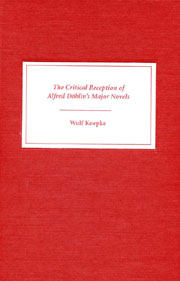Book contents
- Frontmatter
- Contents
- Preface
- Major Novels by Alfred Döblin
- Introduction
- Part One Contemporary Reviews
- Part Two Döblin Scholarship
- 3 Döblin Scholarship: The First Approaches
- 4 Die drei Sprünge des Wang-lun
- 5 Wadzeks Kampf mit der Dampfturbine
- 6 Wallenstein
- 7 Berge Meere und Giganten
- 8 Manas
- 9 Berlin Alexanderplatz
- 10 Babylonische Wandrung
- 11 Pardon wird nicht gegeben
- 12 Amazonas
- 13 November 1918
- 14 Hamlet oder Die lange Nacht nimmt ein Ende
- 15 Döblin's Impact on Other Writers
- Conclusion
- Bibliography
- Index
5 - Wadzeks Kampf mit der Dampfturbine
from Part Two - Döblin Scholarship
Published online by Cambridge University Press: 05 February 2013
- Frontmatter
- Contents
- Preface
- Major Novels by Alfred Döblin
- Introduction
- Part One Contemporary Reviews
- Part Two Döblin Scholarship
- 3 Döblin Scholarship: The First Approaches
- 4 Die drei Sprünge des Wang-lun
- 5 Wadzeks Kampf mit der Dampfturbine
- 6 Wallenstein
- 7 Berge Meere und Giganten
- 8 Manas
- 9 Berlin Alexanderplatz
- 10 Babylonische Wandrung
- 11 Pardon wird nicht gegeben
- 12 Amazonas
- 13 November 1918
- 14 Hamlet oder Die lange Nacht nimmt ein Ende
- 15 Döblin's Impact on Other Writers
- Conclusion
- Bibliography
- Index
Summary
THE INITIAL DISAPPOINTMENT and bewilderment after the publication of Wadzek has had visible consequences for scholarship. Very few scholars have considered the novel worthy of a special study. Müller-Salget skips it altogether. Among the studies on Döblin and Berlin, David Dollenmayer alone devotes an entire chapter of his book The Berlin Novels of Alfred Döblin to the text, in addition to his 1983 paper, “Heroismuskritik in einem Frühwerk von Döblin: ‘Wadzeks Kampf mit der Dampfturbine.’” In this paper, beginning with the usual statement that Wadzek has caused bewilderment and attracted little scholarly attention, Dollenmayer points out the fact that the title does not agree with the text: the struggle of man and machine is not at all Wadzek's real problem — which may be one of the reasons why the novel has been misunderstood. Dollenmeyer's point is reinforced by Anthony Riley's afterword to his new edition, which indicates how much the conception of the book changed during the period of gestation and writing, so that, in a way, the title represents an earlier stage of the work. Dollenmayer follows the lead of earlier readers, for instance Bertolt Brecht, that Wadzek represents a potential tragedy that is turned into a grotesque or an absurd comedy. One essential feature of this is the mock-heroic pathos and the Don Quixote-like misperception of reality by the characters, specifically by Wadzek himself. From this perspective, the ending, Wadzek's escape with Gaby to America, seems more comprehensible in its total lack of logical sequence with the text.
- Type
- Chapter
- Information
- The Critical Reception of Alfred Döblin's Major Novels , pp. 96 - 103Publisher: Boydell & BrewerPrint publication year: 2003



